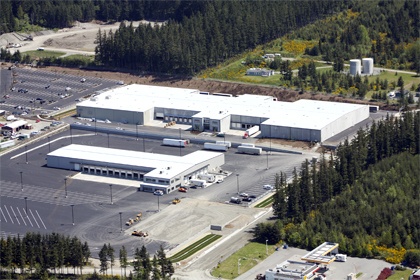With an age-old tool, a pair of scissors, Genie executives and North Bend Mayor Ken Hearing opened the lifting-equipment company’s sprawling new distribution center. The city hopes Genie and future occupants on the surrounding industrially-zoned land will be a steady source of tax revenue.
North Bend annexed the land where the facility sits on July 6.
Genie, which is officially the Aerial Work Platforms division of Terex Corporation, makes lifting equipment which can often be seen on construction sites and being used for maintenance around existing facilities.
Exactly how much money Genie’s two massive gray buildings and their 105 employees will bring in to the city is unclear.
“They’re so new we don’t have a lot of information on them and the taxes,” Estep said.
North Bend has not received the latest information from the state’s Department of Revenue.
The newly annexed area had around $17 million in sales in 2008, according to Estep.
North Bend’s industrial park will be a valuable asset for the city in the future, she said.
It is one of the few remaining industrially-zoned areas along Interstate 90 outside Seattle with undeveloped land. Companies can design facilities to meet their needs, rather than designing around existing facilities.
Snoqualmie Ridge’s office park has been a strong source of tax revenue for North Bend’s neighbor, and gives a glimpse of what the industrial park could mean for the city, Estep said.
The industrial park is “key to the city’s future,” said Duncan Wilson, North Bend’s city administrator.
North Bend has to encourage development that offers sustainable tax revenue.
“Development money is like crack cocaine” for cities — addictive but unsustainable, Wilson said. “When it runs out, you’re like the junkie with no money.”
The city’s Mayor Ken Hearing said he wants more jobs for residents. “Right now, 85 percent of residents commute” to work.
However, the city does not intend to market the land, but will leave that for its owners.
Genie relocated its distribution service to North Bend from its Redmond facility, which it had outgrown and didn’t have any room to expand.
“We were essentially landlocked,” Ford said.
The current site isn’t geographically perfect, “but we were able to build what we wanted to build,” he said.
The company built two massive buildings — a 42,000-square-feet logistics building and a parts warehouse with 150,000 square feet — that are working examples of its ‘lean method’ management system, which seeks to maximize efficiency through simplicity.
In the warehouse, there are few moving parts and technology is kept to a minimum. There are no expensive conveyor belts, just row after row of towering shelves stacked with industrial bits and pieces.
By keeping the layout simple and cheap, the company can quickly reconfigure it as its needs change.
Between 2002 and 2008, Genie grew from $650 million to $2.2 billion in sales without adding much physical capital, Ford said.
Given its simple design, the plant could easily be expanded beyond its current operations, but the company has no plans for growth right now.
“We’re really dependent on a resurgence in either residential or commercial consturction or both,” Ford said.


